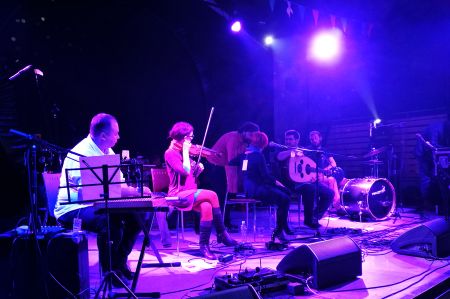Chalgia Sound System - Balkan Fest in Thessalonica
- Written by Portal Editor
Thanks to a note from Max and Jonas, two travelers on their way to Iran, who have just arrived at a stopover in a refugee camp near Thessaloniki, to attend a four-week aid course, we were told that the Balkan festival was held in Thessalonica.
A first information by a link to in the social media looked promising. First of all, something difficult to locate, we had arranged a meeting for the evening at the festival location, not least to get some details about the work and experiences of Max and Jonas in the refugee camp.
With our arrival on the festival site the performance of the group Chalgia Sound System had already begun, which not only performs traditional Macedonian Chalgija music, but also is inspired by the music as a whole and presents very modern Chalchija interpretations. Čalgija or Chalgiya is a Macedonian and Bulgarian music genre, often referred to as pop folk, but also a subgenre of the old urban folk music (Starogradska Muzika) of the Republic of Macedonia and Bulgaria.
Čalgija or Chalgiya is performed by ensembles called Čalgii with instruments such as a dajre (tambourine) and tarabuka (hourglass drum) providing percussion for ut (lute), kanun (zither), clarinet and violin. Čalgija or Chalgiya is an old part of the whole Macedonian and Bulgarian folklore art (this includes the rural folklore as well) and it should not be confused with Chalga (a contemporary Turbofolk music style in Bulgaria).
Some of the most prominent Starogradska muzika performers are "Ansambl Biljana" from the city of Ohrid, which was considered an important centre for this music style in the past along with Bitola, Prilep and others. The emergence of the Starogradska music scene is related to the development of the cities and the bourgeoisie under the influences from the West in the Ottoman occupied Macedonia during the 19th century.
Unlike the rural folk which portrays the life in the villages and the nature surrounding them, the hard agricultural work in the fields etc. the Starogradska muzika lyrics are about the life in the city, its famous loves and tragedies, its famous characters (be they rich traders or poor beggars) etc. Starogradska music uses instruments such as violins and clarinets instead of rural ones such as gajda for example. Also, while rural folk performers usually wear traditional village costumes, the starogradska music performers are usually dressed in European old city fashions (suits, hats and neckties, as well as accessories such as pocket watches, walking sticks etc.).
An important, if not the most important part of the Macedonian old city music is the musical genre called Čalgija (not to be confused with chalga, which is a contemporary Turbofolk style in Bulgaria and Serbia). In both rural and urban Macedonian folk, songs about famous revolutionaries also exist.
Other important starogradska muzika performers are: the vocal groups Oktet Makedonija from Skopje and Oktet Kumanovo from Kumanovo, the vocal and instrumental ensemble Raspeani Resenčani from Resen and others.
This evening we had the pleasure of attending the performance of the group Chalgia Sound System with instruments such as a Dajre (tambourine) and tarabuka (hourglass drum), percussion for ut (lute), kanun (zither), clarinet and violin.
Chalgia Sound System are:
Dobrila Graseska - vocal
Aleksandra Kuzman - violin
Bosko Mangarovski - kanun
Dorian Jovanovic - oud
Filip Krstevski - tarabuka, daire
Please read as well:
The Struma - today Strymonas - river of historical importance
Music unites - language cannot stop common tunes
Museum of Jever - Break on through to the other side
-
 Chalgia-Sound-System - Balkan Fest
Chalgia-Sound-System - Balkan Fest
Chalgia-Sound-System - Balkan Fest
Chalgia-Sound-System - Balkan Fest
-
 Chalgia-Sound-System - Balkan Fest
Chalgia-Sound-System - Balkan Fest
Chalgia-Sound-System - Balkan Fest
Chalgia-Sound-System - Balkan Fest
-
 Chalgia-Sound-System - Balkan Fest
Chalgia-Sound-System - Balkan Fest
Chalgia-Sound-System - Balkan Fest
Chalgia-Sound-System - Balkan Fest
-
 Chalgia-Sound-System - Balkan Fest
Chalgia-Sound-System - Balkan Fest
Chalgia-Sound-System - Balkan Fest
Chalgia-Sound-System - Balkan Fest
-
 Chalgia-Sound-System - Balkan Fest
Chalgia-Sound-System - Balkan Fest
Chalgia-Sound-System - Balkan Fest
Chalgia-Sound-System - Balkan Fest
-
 Chalgia-Sound-System - Balkan Fest
Chalgia-Sound-System - Balkan Fest
Chalgia-Sound-System - Balkan Fest
Chalgia-Sound-System - Balkan Fest
-
 Chalgia-Sound-System - Balkan Fest
Chalgia-Sound-System - Balkan Fest
Chalgia-Sound-System - Balkan Fest
Chalgia-Sound-System - Balkan Fest
-
 Chalgia-Sound-System - Balkan Fest
Chalgia-Sound-System - Balkan Fest
Chalgia-Sound-System - Balkan Fest
Chalgia-Sound-System - Balkan Fest
-
 Chalgia-Sound-System - Balkan Fest
Chalgia-Sound-System - Balkan Fest
Chalgia-Sound-System - Balkan Fest
Chalgia-Sound-System - Balkan Fest
https://www.alaturka.info/en/culture/music/3729-chalgia-sound-system-balkan-fest-in-thessalonica#sigProId4a38d1fc9f

